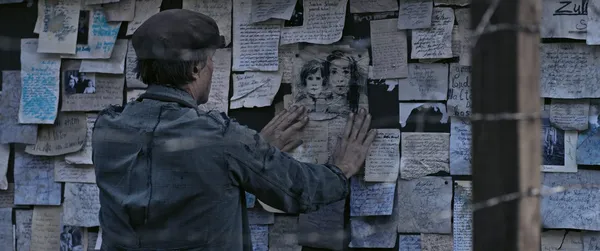 |
| August Diehl in Plan A Photo: Getaway Pictures |
It’s a little known aspect of the history of the Holocaust, that after World War Two ended, not all Jewish survivors in Germany felt able to pick themselves up and get on with their lives. Sadly, many died by suicide, even after surviving the horror of the camps. Others, however, found their minds focused on revenge. There were units, some official and some less so, which hunted Nazis, either bringing them before the courts or delivering summery justice. There was also at least one group of people, Nakam, who looked beyond the Nazis at the many German civilians who had supported their murderous actions or simply stood by and done nothing to intervene. About those people they whispered darkly “Six million of them for six million of us.”
 |
| Yoav Paz with Michael Aloni and Doron Paz, on the set of Plan A Photo: Patricia Horlbeck, courtesy of Getaway Pictures |
“What would you do if you’d just been through something like that, and seen your family murdered?” is the question posed at the start of the Paz brothers’ latest film, Plan A, which follows a man who infiltrates the group to try and prevent a devastating incident, but who finds his sympathies torn. It’s a question which Yoav Paz raises again when I meet him to discuss the film. Whilst he’s anxious to get across the horror of the titular plan, which would have seen an entire city’s water supply poisoned, he also wants people to understand that it emerged from trauma.
I’ve previously interviewed Yoav’s brother, Doron, about their film The Golem, which centres on a small Jewish community facing persecution in Medieval Europe, and about their first-person demonic horror film Jeruzalem. Doron can’t make it this time, but as Yoav and I get talking I reference that previous work and the fact that Plan A also feels like a horror film in some ways.
“I don't think we did it on purpose, but I think it's our natural approach to film,” says Yoav. “We're more attracted to the dark side of humanity and tell stories a bit on the dark side. And of course, Plan A is as dark as it can get. The subject, the topic, the revenge idea, etc. So, yeah, I agree that the you can say that we approach it in a way as if it was a horror film, even even though it's not, it's a historical thriller or drama. But of course, the materials are very dark.”
I remember hearing briefly about it when I was a child, and I've never heard anyone talk about it since. Is it a subject which people prefer to avoid?
 |
| Max joins the Jewish Brigade after the war Photo: Patricia Horlbeck, courtesy of Getaway Pictures |
Yoav shakes his head. “I think it's just an unknown story. We never heard about it. I know my friends, family, maybe knew something very light about the subject. But this is why we decided to do this film, because when we came across this story about the group of Jews, Holocaust survivors, trying to take revenge after the war, it blew our minds because we never got to hear this kind of stories. So we said ‘Wow!’ Of course, revenge is the most primal feeling and the most basic of cinema. And we decided that that will be our next film.
“It took us ten years to make it but we were attracted to the subject because it was an unfamiliar one, I think because for many years, the survivors didn't want to talk about it. Only in the recent years – unfortunately, most of them passed away already – but only in the recent years, they actually started to talk about it, and to raise the subject. And then there was a documentary made about it a few years ago, and also a book by Dina Porat, the Chief Historian of the Yad Vashem Institute. So only in the past few years, it started to actually talk about this subject. But for many years, they kept it a secret in a way.”
So how did they go about researching it?
“The first thing we did was to start meeting the real people behind the plan, who are still alive. When we started working on this on this project around eight years ago, we started meeting and interviewing them. We knew the facts of it because we had a lot of meetings with a professor and we read some stuff about it, but we were more attracted when we met them, the real people that were in this plan. We asked them a lot of more dramatic questions about the way they felt, the way they thought. How was it for them actually to stay in Germany right after the war? How was it for them to work and live with German people who just few months earlier tried to kill them and kill their families?
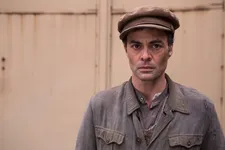 |
| Nikolai Kinski in Plan A Photo: Getaway Pictures |
“We asked them a lot of stuff. Only then we started writing the script, and our biggest problem was that we had so much on our plate. It's such a big story, and everywhere you turn, there's more drama and more stories behind it. So the first versions of the script, as you can imagine, were so long and way full of details, so it took a while just to manage through all this stuff. And unfortunately, it's not a TV series, it's feature film, so there were a lot of points we had to skip. But maybe one day, we'll make it into a TV show, and then we can go deeper and deeper into the subject.”
I note that there's a myth in many parts of the world to the effect that after the war, all the bad Germans went away, and everything was okay again. And obviously, that's not true, but it’s still quite striking in the film, the way that we see that anti semitism is still there, that Jewish people’s lives are still in danger. Was that something that he felt it was really important to address?
“Yeah, I think it's still relevant to today,” he says. “Germany took responsibility on their actions, and there was a process, there were a lot of inside talks about it, but still, you came across a lot of voices that says, you know, that there were the Nazis and then there were the Germans – like, somehow, the Nazis were completely separate from the German people at the time, like they came from out of space or something like that. But the sad truth is that most of the German people at that time followed Hitler, and many of them, even if they weren't part of the Nazi Party, they took some part in this monstrous machine.
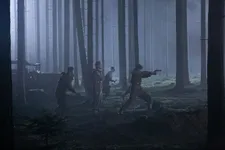 |
| Hunting Nazis Photo: Getaway Pictures |
“So yeah, what we try to show a bit in the film is that in the first few months after the war, there wasn't a fresh start. It was a long process. In those first few months after the war was over, there was still a lot of wrongs and attacks against Jews. They were killed. There was chaos all over Europe, it was a very dangerous place for many people. It was a very difficult time for for a lot of people, but for Holocaust survivors, mostly.”
We discuss the idea of good and bad victims and the odd notions which people who have never experienced have about the proper way to respond to it, and I ask about the challenge of presenting an audience with such complex characters.
“That is the core of this film, where we threw we try to throw the question to the audience, what would you do in these people’s shoes?” he says. “The Jewish Brigade took revenge at Nazis, and then it was Abba Kovener’s group who did Plan A, who actually tried to kill six million Germans. So these men and women, they were the minority. Most of the Holocaust survivors right after the war went on with their lives. Many of them came to Israel, many of them to the United States or other countries. And for them, the revenge was to start a family and to live a long and prosperous life. But this minority group, a very small group, decided that they cannot move on with their life and they have to do something that the world will notice, so they cannot be silenced.
“They felt the urge to shake the wall and to move history out of its course, because in their eyes, as they looked around and they saw Germany being built again, they saw people just living their life, almost like nothing happened. So they try to do something very extreme, and to take revenge on a national level. So the film deals with this group, but we need to also need to remember that they were a very small group, and the majority of survivors did not do any actions of revenge.”
 |
| Max gets a job in the water treatment plant Photo: Patricia Horlbeck, courtesy of Getaway Pictures |
But it gives us a chance to look at just how traumatised people were, I suggest. We see films that talk about survivors decades later, and films which address the war years themselves, but there seems to be very little about the period just afterwards when people were dealing with that level of distress.
“Yes, yes, exactly. There are very few films and books that deal with the period of time right after the war. And for us, it's a fascinating time to see. Because in a way the world moved on very fast, too fast. You know, there were Germans, there were Nazi officers that went to the ‘States and became rocket engineers. And there were the Nuremberg trials, but not many of the Nazis actually got real punishments, and many, many of them got away. And in a way the world moved on. It was, of course, a very chaotic time, and people were so broken around Europe and around the world, after this horrible World War Two, but in a way, the world moved on too quickly, especially in the eyes of Abba Kovner’s group. So yeah, it's a fascinating time.”
It must have been very difficult for the actors to be dealing with that level of trauma, going into that space. How did Yoav and Doron get those performances from them, and how did they make sure that they were okay when they were playing those roles?
“August Diehl, the main protagonist, obviously is amazing,” Yoav says. “He read so much about the subject, he knew more about it than us. Before we went into shooting, six months before, he asked us to give him all the material possible. We gave him this big amount of books and he read everything. He knew so much about the subject, he kept thinking about it, we had a lot of discussions and talks. And so he was really prepared regarding the way those people felt and how they were acting. But of course, there were the difficult scenes – and most of it's a very intense film – I think most of the scenes were quite difficult. So we were lucky to have a an actor like August Diehl. That is, he is such a professional.
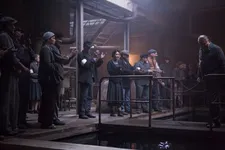 |
| Syvia Hoeks and Michael Brandner in Plan A Photo: Getaway Pictures |
“It was it was amazing to see him preparing himself for the scene, keeping quiet. Not like the Israelis, because the Israeli actors, they can be wild, they can make a lot of noise on the set, which has good parts, because sometimes when it's so difficult, and you’re shooting late at night, it's nice to have a group of actors that bring up the energy. But the European actors, especially August and Sylvia Hoeks, they were super serious all the time. And we had a lot of discussions before the scenes, what's going to be [happening] and what's the state of mind, and they give it just an amazing performance. It was just mind blowing.”
We talk about the visual side of the film, and the fact that for most of us now, when we imagine what Germany looked like at that point in history, are basically imagining what we’ve seen in films. There are established ways of presenting the landscape. How did the Paz brothers make it their own?
“The most difficult thing was, of course, to create a destroyed Germany. The plot of the film takes place in Nuremberg, right after the war, when it was all destroyed. It's an Israeli-German co-production, and we were scouting for locations in Germany. And of course, everywhere you look these days, it's all green and nice. And so it was very, very challenging. And then we decided to shoot all the exteriors of the film in Ukraine. We shot most of it there, and of course, we had an amazing Ukrainian crew with us. It's heartbreaking to see what's going on right now.
“We shot it just before Covid and we shot all the exteriors in Lviv. We just closed an old street in the centre of it. There were cafés where a lot of tourists were of course. We needed to hide them, and then to block the street. And our department did an amazing work of creating the atmosphere and how they used to look. We are very proud that this film, that it is what we achieved in the creative side.
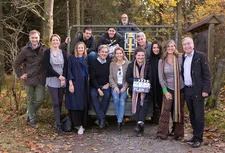 |
| The team behind the filming of Plan A Photo: Patricia Horlbeck, courtesy of Getaway Pictures |
“It was important for us that the film was started a bit on a more lighter side. So in the beginning of the film, we see Max, our protagonist, more in the woods and more in the fields and it's more green, and we have more extremely long shots that can draw the audience into this adventure. And then we move to the second part of the film when the protagonist moves to Nurnberg, and then it's a different style, to be more claustrophobic and more dark and more extreme.
“That is according to the plot, because the film starts with the idea of specific revenge: he joins the Jewish Brigade and they take revenge at Nazis and this, I think, most people can relate to. They took Nazis to the forest, who did horrible things, they put them on court martial, on trial. And then when they found them guilty, they shot them in the forest. And in this way, the brigade killed hundreds of Nazis, in this idea most people can relate to. So we started filming more lighter, in a way, an approach to revenge. But then we move to the much more complicated and darker idea of Plan A, of actually trying to revenge on the civilian population, not just the Nazis or ex soldiers.”
So what does he hope that people will take away from the film?
“I want them to think,” he says. “I want them to be curious about the subject, I want them to go deeper and research more and read more books about it, and see some wonderful documentaries that we might make about it. Because it's a drama to feature film, we could only touch on the complicated ideas of revenge. So we wanted to open a hatch to this unknown story so that people will find out more.
“A lot of people saw Schindler's List, of course, and other Holocaust films, but not a lot of people were exposed to the idea of Jews taking revenge in their own hands. So first of all, we wanted to expose this important story. And second of all, we wanted people to think about what would they have done in these people's shoes? Would they move on with their life? Or would they try to do something so extreme like they did? So I think people coming out of the cinema have a lot of thoughts. We had some really amazing Q&A sessions after screenings, and people have so many questions, and you can discuss this subject for hours. You know, it's a very complicated one. So in the short time we had on screen, we just touched this complicated story.”
He and Doron are now working on a television series with science fiction elements, he says, and they hope to start shooting it next year, but it’s a secret for the meantime.
Plan A opens in US cinemas this Friday, 7 October.





















